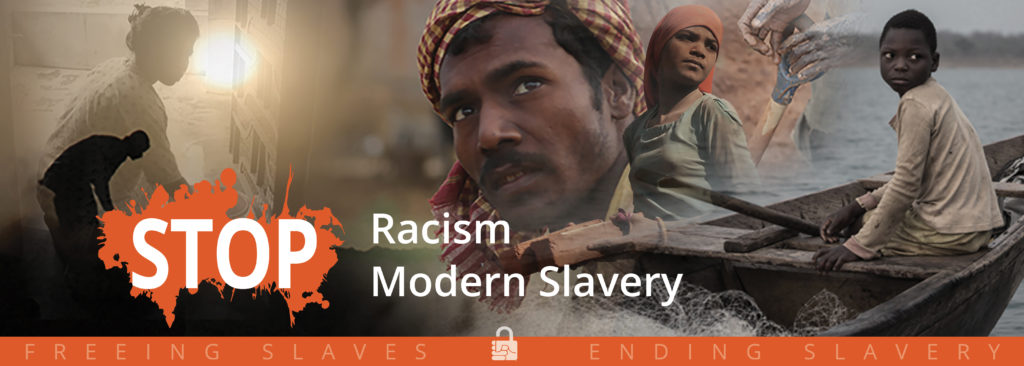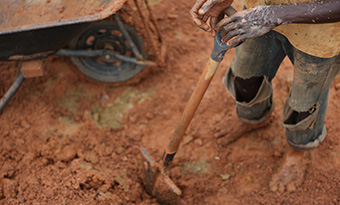Promoting Racial Justice Can Stop Modern Slavery
Racial injustice is a legacy of slavery. The Emancipation Proclamation and the 13th Amendment outlawed slavery in the U.S., and the U.N. Declaration of Human Rights helped prohibit slavery around the world. But these remarkable achievements did not end slavery. And they have not eradicated systemic injustice that modern forms of slavery still cause today.

Racism & Slavery in the World Today
In Mauritania, darker-skinned residents are trapped in forced labor by those with lighter skin. In the Dominican Republic, immigrants from Haiti are locked into lives of slavery on sugar cane plantations. In India, the caste system drives millions of people – including children – into bondage at quarries, farms and factories.
Modern slavery marginalizes people in vulnerable racial groups. Human traffickers target these disadvantaged people, perpetuating the brutal cycle of slavery.
The Free the Slaves Solution
We work at a community level to change the conditions that allow modern slavery to exist, helping to end slavery and racial injustice. Our strategy to make make entire villages slavery-resistant, helping to end marginalization and discrimination. We do this through education and mobilization at the grassroots, by holding those in power accountable, and by influencing governments, businesses, politicians and social leaders to take a stand for freedom and equality.
Our work to dismantle slavery’s causes and impacts includes overcoming racism and prejudice. This work is challenging and requires a long-term commitment. As a human rights organization, Free the Slaves understands the urgent need to take the lead in the anti-slavery movement.
You Can Help
As we continue to stand for the values of social justice, equal rights, and human dignity, we will work in solidarity with other institutions of conscience – and with you – to move freedom forward everywhere in the world.
Will you continue to support Free the Slaves as we promote equal rights and transform power structures that determine the future? Please join us in advocating for racial justice.
2020 Fall Campaign Blog Posts
Can You Help Stop Child Slavery? Did you know that 1 in 4 victims of modern slavery are children? Children like Kwezi. At 7 years old, Kwezi left his childhood home with expectations of a better life and more opportunities. But that was far from his reality. Instead, he was tricked by traffickers and was forced to work on dangerous and deadly fishing boats, with little food and rest. What happened to Kwezi has happened to more than 10 million children worldwide: systemic child slavery. Modern slavery is worst in Africa and Asia, fueled by global inequality and discrimination. Too often, it’s children who are caught in slavery’s vicious grip.
Help Free Indians Trapped in the Caste System Are you aware of the caste system in India? If you’re unfamiliar, it is a social structure that divides different groups into ranked categories. A person’s caste determines their social status, their livelihood, who they can marry and where they can live. Most of them are primarily bonded agricultural laborers trapped in an inescapable cycle of extreme poverty, illiteracy, and oppression. And, though it’s illegal, another 40 million Indians are bonded workers, working to pay off familial debts that could have been incurred generations ago. 15 million of these are children working as actual slaves, or in slave-like conditions for less than $1 a day.
Stand Against Anti-Haitian Racism Haitian migrants and their descendants born in the Dominican Republic have been historically and systemically racially discriminated against based on ethnic group, race and nationality, and because of their economic, social and cultural situation. Due to discriminatory policies, most Dominicans of Haitian descent live in conditions of extreme poverty and marginalization. As a result of the discriminatory policies – many of them are usually undocumented, which means they do not benefit from social assistance programs. Many of the Haitians in Dominican Republic live in dire conditions that have brought about numerous human rights violations including modern slavery and human trafficking.
Help Stop Racial Discrimination Against Haratines Did you know that Mauritania was the last country in the world to ban slavery? Slavery dates back hundred of years in Mauritania, from a period when Arab Berbers raided and enslaved black Africans settled along the Senegal River, dominating and eventually submitting them into their own social system. Though Mauritania outlawed slavery in 1981, it allowed the continuation of hereditary slavery until 2007, when Parliament enacted a formal law. Mauritanian officials have often only paid lip service to enforcing the ban. Earlier this year, Free the Slaves embarked on a new initiative in Mauritania where we will work with our partners to promote and raise awareness of human rights and the lack of justice available to marginalized groups in Mauritania.
Can You Help Promote Safe Labor Migration? The transatlantic slave trade was the largest forced migration in history. For more than four centuries, Africans were kidnapped, sold to slave traders, and forced onto slave ships during the legal slave trade to support the economies of Europe, the Middle East and the Americas. In current times, slave traders pose as legitimate job recruiters. They trick migrants to leave home in search of better lives, only to trap them in forced labor once they are far from their families and legal support. The Middle East and Persian Gulf Regions, once hot spots of historical slavery, are back in the spotlight. Migrants from around the world travel to the Gulf for work, especially from India. They are frequently treated as an underclass, trapped in modern forms of slavery– in part, because of their racial or ethnic origins.
Are You Financing Modern Slavery and Racial Inequality? The things we buy are decisions we make about the world we want. Everyday purchases can unknowingly fuel modern slavery and the racial inequality it creates. Our friends at 522 Productions have volunteered their time to produce a vivid video reminder of the impact that the globalized economy has on vulnerable individuals from disadvantaged groups. You can break the chain of exploitation by supporting Free the Slaves. We help entire communities resist human traffickers and become slavery-free.
Leave No One Behind on Human Rights Day It’s Human Rights Day, when the world commemorates the U.N. Universal Declaration of Human Rights, which includes the right to be free from slavery. Human rights are supposed to apply to everyone, everywhere, without regard to sex or race or age. But in Ghana, three boys from a disadvantaged family were denied their basic rights until a local official working with Free the Slaves took a courageous stand to protect them.
How You Can Change the World in 90 Seconds It must have seemed like an impossible challenge more than 150 years ago, that the moral imperative to end the slave trade and injustice it inflicted on Africans could actually succeed. Back then, slavery was considered ethically acceptable and economically necessary. Still, abolitionists won. They got slavery outlawed. But the job isn’t finished, and we now follow in their footsteps. Today, it might seem equally impossible to liberate 40 million people from modern forms of slavery around the world. But we will win, again.
Why We Have Hope I have hope as we approach the year-end holidays, and I hope that you do, too. With the many challenges we face in promoting equality and universal freedom in the world today, what brings me hope is the optimism I hear from slavery survivors and their families around the world. Freedom is contagious. When one person breaks free, they inspire the next person to take their own first step. When one community becomes slavery resistant, the next village follows their example. Freedom is a powerful force for justice, equality, dignity – and hope.


